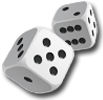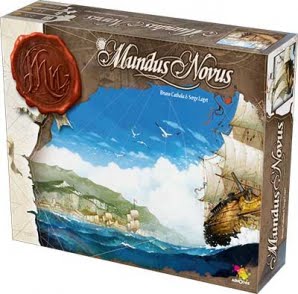



play board games
Board game reviews, strategy tips & session reports
Mundus Novus Review
 Stats:
Stats:
No. of players: 2-6
Amount of time to play: 45-60 min
Age requirements: 14+
Set-up time: 5 minutes
Mundus Novus is a card game themed around trading goods in the New World. In fact Mundus Novus is Latin for New World. You must earn 75 doubloons before your opponents or hold one of each resource to win.
Mundus Novus Rules Description:
Mundus Novus has two main card types, resources and developments. Resources are numbered one through nine and the higher numbered cards are rarer. There are also Incan Relics which act as wildcards.
Developments may be bought and have a wide variety of functions. Most help you get or keep more resource cards and some even get you doubloons each turn. I am going to highlight two developments, warehouses and caravels. Warehouses allow you to keep cards between turns. Caravels allow you to get more resources each turn.
To start each player gets five resource cards, three resource cards are placed face-up to create a market and five development cards are placed face-up.
Each turn is made up of four steps, Event, Supply, Trade and Progression. An event occurs if the first development card has an event icon in the corner. The events may help or hurt you depending on your strategy and the developments you have bought.
During the Supply phase, you deal each player five cards. You also place a card face-up for each caravel in play. You get to take one of these extra resources for each caravel you have.
Each turn there is a Trade Master. The Trade Master determines the number of cards players must trade (between 2-4). You secretly choose that number of cards from your hand then all players simultaneously reveal their cards. The player with the highest total in resources is the new Trade Master.
When you trade you take a face-up card from another player and then give them one of your face-up cards. They have the option of taking it into their hand or taking a card from the market instead.
Progression is the phase in which you earn doubloons and buy developments. In order to buy developments you must have a set of at least three resources. The rarer the resources in your set, the more face-up cards you can access. Incan relics can help you create these sets.
To earn doubloons from your hand of resources, you’ll want to have different resources. You gain a certain number of doubloons for a certain number of different resource cards. The more variety you have the better. Incan Relics are cashed in on a different scale but can still earn you doubloons.
You may turn in resources for doubloons and buy a development card in the same Progression phase. But each card may only be used once.
Once someone has 75 doubloons or a set of all nine resources and an Incan Relic, the game is over.
Quick Review of Mundus Novus:
Mundus Novus plays quick, is beautiful and is fun. The way trading works is interesting without being too complex. You will often need to decide if you want to part with rare goods to become the Trade Master. Or if you should try to complete a set and purchase a development or just earn doubloons.
The art is really nice and the components are high quality. The theme is nothing new but some of the development cards are famous explorers. The rulebook gives you an explanation of the explorer’s abilities and a short bio. I thought was a nice touch and after reading some of the bios helped the theme stick more when I played the game later.
One thing I really wish was included were player aids. The charts for the exchange rate of unique cards to doubloons are needed by most players every turn. They are on the back of the rulebook and you will find yourself passing them around a lot.
There are a few different paths to victory in Mundus Novus. Depending on the developments you have access to and buy your strategy can vary from game to game. Trading and development purchases are more random than I prefer as more information would help guide your moves.
Mundus Novus is fun and a very good trading game. It has a nice play time (usually under an hour) and scales well with 2-6 players. If you like trading games I think you should try this one out. Just be aware of the randomness in it. Some players won’t mind this while others will be frustrated by it.
Score and synopsis: (Click here for an explanation of these review categories.)
Strategy 3 out of 6
Luck 4 out of 6
Player Interaction 4 out of 6
Replay Value 4 out of 6
Complexity 3 out of 6
Fun 4 out of 6
Overall 4 out of 6

Cool! Sounds fun!
Just wanted to share that our games last longer than 60 minutes, especially with five or six players.